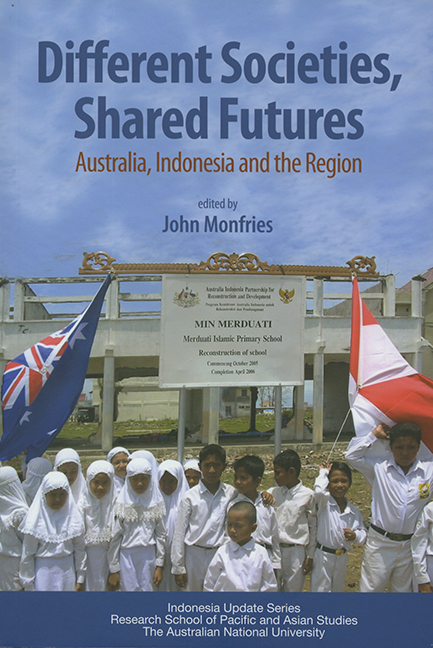Book contents
- Frontmatter
- Dedication
- Contents
- Tables
- Figures
- Contributors
- Acknowledgments
- Opening Address by Richard Woolcott AC
- 1 Introduction
- PART I Regional Viewpoints
- PART II Security Aspects
- PART III Mutual Perceptions and Irritations
- 7 Strange, Suspicious Packages
- 8 The Indonesian Student Market to Australia: Trends and Challenges
- 9 The Centrality of the Periphery: Australia, Indonesia and Papua
- PART IV The Economic Partnership: Aid, Economics and Business
- PART V Conclusion
- Glossary
- References
- Index
8 - The Indonesian Student Market to Australia: Trends and Challenges
from PART III - Mutual Perceptions and Irritations
Published online by Cambridge University Press: 21 October 2015
- Frontmatter
- Dedication
- Contents
- Tables
- Figures
- Contributors
- Acknowledgments
- Opening Address by Richard Woolcott AC
- 1 Introduction
- PART I Regional Viewpoints
- PART II Security Aspects
- PART III Mutual Perceptions and Irritations
- 7 Strange, Suspicious Packages
- 8 The Indonesian Student Market to Australia: Trends and Challenges
- 9 The Centrality of the Periphery: Australia, Indonesia and Papua
- PART IV The Economic Partnership: Aid, Economics and Business
- PART V Conclusion
- Glossary
- References
- Index
Summary
BACKGROUND
For the past decade, Australia has been the overseas study destination of first choice for Indonesians. Its major competitive advantages are its proximity to Indonesia, the quality of its education and the range of courses available to international students. Indonesians are also attracted to Australia because it is an English-speaking country and has a reasonable cost of living compared with other Western countries.
Australia currently enjoys approximately 37 per cent of the overseas-bound Indonesian student market. The United States attracts another 22 per cent of the market, Singapore 15 per cent and Malaysia 7 per cent. At the end of August 2005, 15,158 Indonesians were enrolled in study programs in Australia. Education was Australia's fourth-largest export commodity in 2003–04, worth A$5.9 billion (DFAT 2005a). The export of education to Indonesia alone yields approximately A$500 million per annum for Australia. This amount is derived predominantly from living costs and tuition fees from on-shore programs.
Australian education and training services, delivered through the Australian Development Scholarship (ADS) scheme, the Australian Partnership Scholarship (APS) scheme, the Indonesia–Australia Specialised Training Project and so on, account for a total of 50 per cent of Australia's aid to Indonesia. Through the ADS and APS schemes, 600 Indonesians are awarded scholarships annually for postgraduate study in Australia.
Indonesia, as a developing nation, is under great pressure in the area of education. With a population of approximately 220 million people, more than 44 million of whom are in the 19–24-year age bracket, Indonesia's ability to provide its citizens with access to all levels of education has become a critical issue. With development emerge aspirations for a good education and equal employment opportunities. Both are crucial to social and political stability.
Unfortunately, Indonesia is still unable to provide its people with the standard of education they need for their nation to progress in the world, nor is it able to cater adequately for the growing demand for more university placements. Remaining competitive regionally is also proving to be a challenge for Indonesia owing to its lack of skilled labour. Compared to neighbouring Association of Southeast Asian Nations (ASEAN) countries, Indonesia currently ranks among the lowest in relation to access to and quality of education and overall quality of human resources.
- Type
- Chapter
- Information
- Different Societies, Shared FuturesAustralia, Indonesia and the Region, pp. 87 - 105Publisher: ISEAS–Yusof Ishak InstitutePrint publication year: 2006

